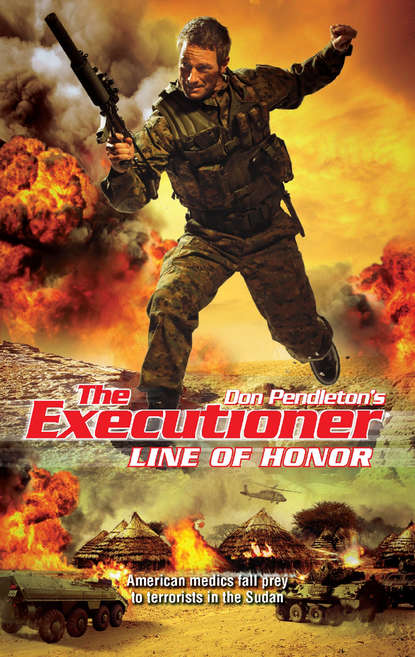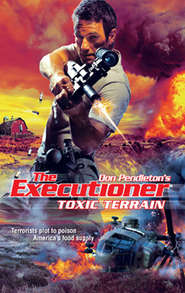По всем вопросам обращайтесь на: info@litportal.ru
(©) 2003-2025.
✖
Line Of Honor
Автор
Год написания книги
2019
Настройки чтения
Размер шрифта
Высота строк
Поля
Bolan brought up his binoculars.
It was a scene he had seen more times than he could count. The people walked and limped in a small mob. Everything they owned they carried. The lucky ones had blankets wrapped around them against the evening cold. There were far too many women, children and the elderly, and far too few men and boys. They hunched and searched the sky for the sound of jets or rotors. They cast fearful looks behind them for the terror that had driven them into the desert night. Bolan saw no weapons beyond walking sticks and crutches.
“Jesus,” Ochoa muttered. “‘Give me your tired, your poor, your huddled masses…’”
“‘Yearning to breathe free,’” Bolan continued. “‘The wretched refuse of your teeming shore. Send these, the homeless, tempest-tost to me, I lift my lamp beside the golden door.’”
Ochoa turned to Bolan. “Jesus, Striker! You gave me goose bumps!”
“You been to the Statue of Liberty, Sancho?”
“No.” Ochoa grinned beneath his night-vision goggles. “But I’ve been to the Rio Grande.”
Bolan snorted. “You’ll do, Sancho.” He clicked his com link. “Scotty, bring up the SAW. I also need a canteen of coffee. Put a lot of sugar and powdered cream in it.”
“Roger that, Striker. On the double.”
Mrda’s sniper rifle never wavered from the refugees. “How do we play it?”
“Me, Sancho and Haitham are going to go talk to them. You and Scotty are going to cover us.”
Ceallach trotted up the arroyo with his Type 81-1. It was simply a Type 81 assault rifle with a longer, heavier barrel, a bipod and a 75-round drum. The Briton handed Bolan the canteen, then snapped open the legs of the bipod and took position next to Mrda. “Bob’s your uncle, Striker!”
Ochoa sighed. “I don’t understand a word he says.”
“Let’s take a walk.” Bolan walked out into the night flanked by Ochoa and Haitham. They covered about a hundred yards and stopped. Bolan watched the mob blindly approach through his night-vision goggles. At fifty yards he pushed up the device on top of his head and took a glow stick out of his web gear. He gave the stick a bend and a shake and a green glow filled the night. The platoon of refugees immediately came to a halt. Several individuals bolted from the group in random directions. Bolan stood with his rifle slung and waved in a friendly fashion. Haitham called out in Arabic. An old man and an old woman detached themselves from the group. Each wore a gray humanitarian-relief-issue blanket like a shawl and each leaned on a stick. The two came forward warily. The old man had an ancient-looking Sudanese arm dagger strapped just below his shoulder. Haitham nodded to the elderly couple and exchanged quiet words with them.
He turned to Bolan. “They are Sirel and Mina. They are Christians, and displaced farmers.”
Bolan uncapped the canteen and held it out. Sirel caught the smell of coffee and insisted that Mina drink first. Sirel waved his arms and spoke rapidly. Haitham translated.
“They say bad men attacked their camp, though they got warning across the missionary radio and managed to leave. They fear the bad men are still looking for them.”
Ochoa rolled his eyes. “What do they have that anyone would want?”
“Women,” Bolan said. “And children. They’re commodities around here.”
Ochoa turned his head and spit. “Christ wept.”
“Haitham,” Bolan said, “ask them if it’s Captain Osmani they’re afraid of.”
Mina spoke for the first time. She started speaking low, but she began waggling her stick and speaking in greater and greater outrage. “Mina says that Osmani is bad. Everyone knows who he is. He comes and he takes any gold or silver or medicine, but these men are worse. They come on horseback. They take everything, and they are led by a terrible individual called Yellow Mnan. They say he keeps hyenas in his main camp and feeds people to them.” Haitham stopped translating. “Something about him being an…evil ghost?”
Bolan considered that. “Ask her if Mnan is black like you but has skin like me.”
Mina nodded and made the sign against the evil eye.
“He’s an albino.” Bolan knew how much of a badass an albino had to be to rise to a position of leadership in a genocidal civil war.
Mina continued.
“Anything Mnan does not want, he burns,” Haitham said. “Anyone Mnan does not want, he kills.” He frowned. “And Mina says when they kill they take their time.”
“Sound like some real loco hombres, Jefe,” Ochoa added.
“Janjaweed,” Bolan said.
Sirel and Mina flinched in unison.
Ochoa brightened. “Ganja weed?”
“Janjaweed, Sancho. It’s an Islamist militia. They were originally drawn from the nomadic tribes in East Darfur. The Sudanese government used them to try to pacify the rebelling farming tribes who were mostly Christian and Native African animists. The lines got blurred pretty quickly. At one point it was rumored the government in Khartoum was emptying the prisons, giving each man a horse and an AK, saying, ‘Go west, young man.’ They were widely accused of genocide.”
“Jesus…”
“Jesus is right, Sancho. They’re real bad hombres, and loco.” Bolan did a quick head count and clicked his com link. “Russo, I need thirty-seven protein bars and the same of the bottled waters.”
“Sacre bleu!” The French agent sounded bemused. “Do I detect a big, fat heart in that American chest?”
“Just do it.” He turned to Haitham. “Ask them how far behind Mnan and his Janjaweed men are.”
Sirel spoke for long moments. Haitham looked as if he might cry. “Sirel says his people are the dead, walking in dust. They leave little to follow unless one of them dies. He says Mnan probably does not know where they are, but he will be roaming for his next prey.”
“Jefe?” Sancho asked.
“Yeah?”
“I don’t like this Mnan. I don’t like him at all.”
“Me, neither, Sancho.”
Nelsonne walked up with Onopkov behind her. The lanky Russian carried a big box. The refugees were scared of Bolan and his group, but they recognized international aid immediately and swarmed forward for food and water. Nelsonne smiled, chucked chins and passed out food and water and hugs like a pro. More than the concentrated calories and desperately needed hydration, the woman was passing out empathy, and hope. She was also quickly interviewing each person she fed. The French agent was also cataloging interviews as she distributed aid. When the last elderly person had cracked the cap on his water bottle and the last child had crinkled open the wrapper of his food bar, Nelsonne rose and leaned in to Bolan. “Tell me.”
“What?”
“Tell me we’re going to wipe the Sudan with this Mnan.”
“The French do have the term ‘mission creep,’ I assume?”
Bolan had to factor in the fact that Nelsonne was an intelligence agent and quite possibly had her own agenda, but the woman seemed to be getting genuinely worked up about the refugees. “Then why did we stop and give them food? We fatten them up for slaughter?”
“To get intel? Because we couldn’t have them walk on top of us and set up camp?” Bolan suggested.
“We’re going to kick Mnan’s ass.”
“We just might teach him not to go our way.” Bolan watched the refugees as they finished their rations. They sat huddled together, literally leaning against one another to hold themselves up. Half had already fallen into exhausted sleep. Some couldn’t help themselves and tore into the rations Nelsonne had issued for the morning. “Or theirs.”
“So we kick his ass?”











